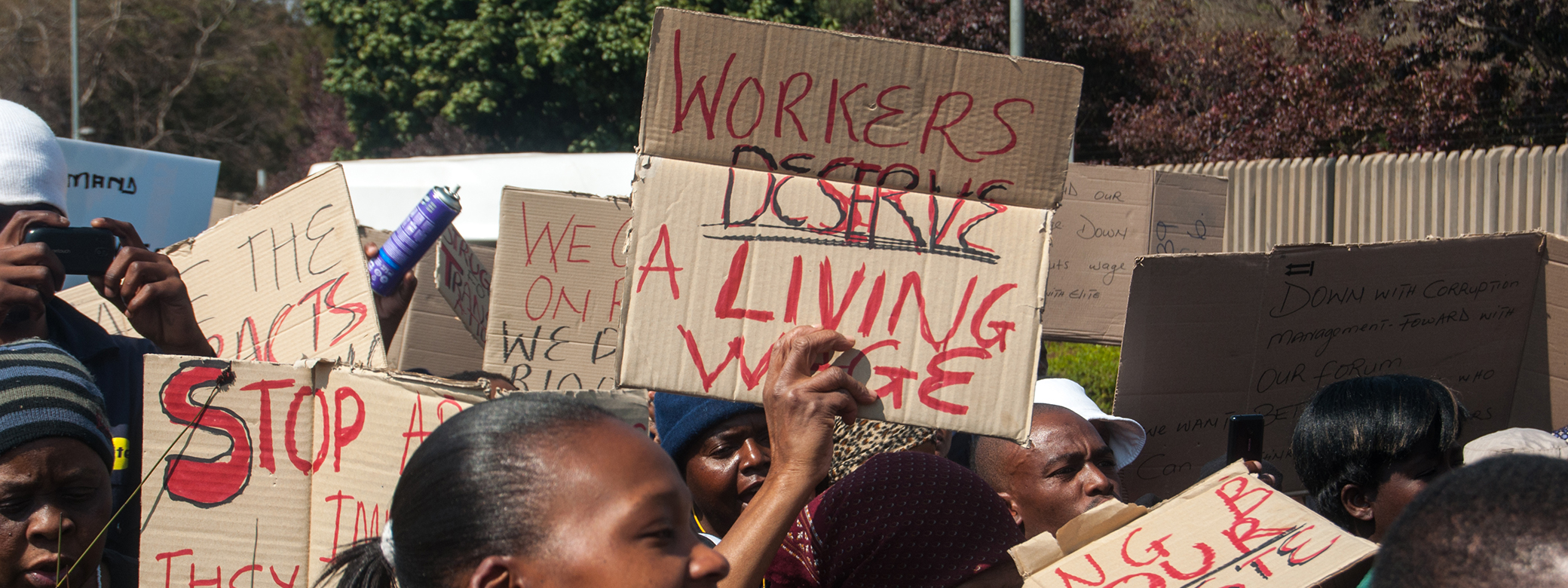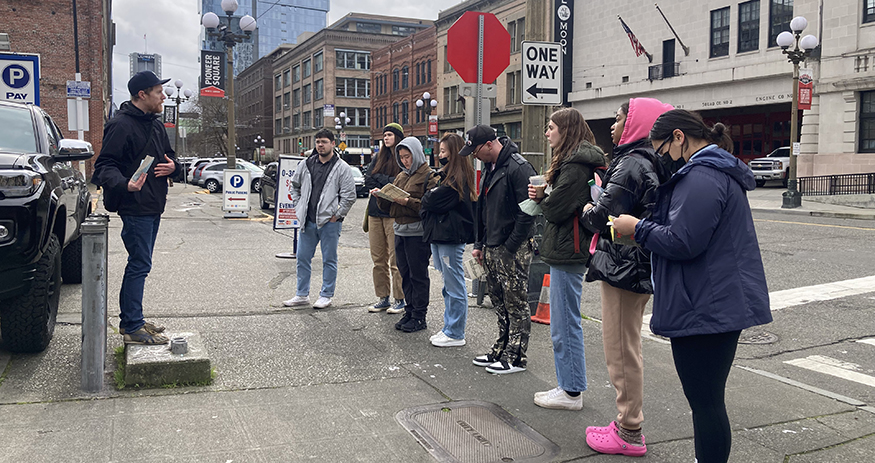
Before Rachel Sun applied for a labor internship as a UW senior, she had dipped a toe into activist work. The internship — through the Harry Bridges Center for Labor Studies in the UW College of Arts & Sciences — provided a deeper dive. Sun interned with the Massage Parlor Outreach Project, or MPOP, which empowers and supports Asian immigrant massage and sex workers.
“MPOP was the start of me being aware of labor issues,” says Sun (BA, International Studies, History, 2021). “It was the beginning of my politicization and activism.”
The internship was through the Bridges Center’s Building A Movement (BAM) Labor Internship program, dedicated to the local labor movement. Now in its third year, interns have worked at grassroots nonprofits, labor unions, policy-focused organizations, and more. All BAM interns are paid for their work.
“It’s so important that the interns get paid,” says Sai Ahmed, Bridges Center assistant director of student and community engagement. “If we’re not paying our students, then we’re not materially valuing their work. As a labor center, it’s very important for us to be practicing and enforcing that value.”
Supporting Workers, Broadly Defined
The Bridges Center, established in 1992, is named for legendary union organizer Harry Bridges. Yet the Center’s focus extends far beyond the study of organized labor.
“At the Bridges Center, labor studies is articulated very broadly,” says Ahmed, also a graduate student in geography. “It is the study of working people everywhere. Immigrant rights, race and gender discrimination in the workplace… labor intersects with all these other social justice movements.”
I come from a family of farmworkers who experienced mistreatment and worked to get unionized in the early 2000s. Being a voice to my family and community is rewarding.
The BAM Internship reflects the Center’s breadth. Each year, up to a dozen students participate, choosing from six or more internships representing diverse aspects of the labor movement. Some internships change each year, while others, like MPOP, are offered annually.
“Students who are interested in organized labor can work with unions and see what that day-to-day work looks like,” says Ahmed, “but we also partner with the Washington State Labor Council, which does a lot of community building and affiliate work with labor organizations. And we have partnered with more grassroots organizations to provide an experience of what on-the-ground, community-centric work within the labor movement looks like.”
From Internship to Ongoing Commitment
MPOP is one of those grassroots organizations. Sun applied for the MPOP internship in the aftermath of the Atlanta massage parlor shootings. “Those shootings hit me with deep shock and grief being Chinese American,” Sun says. “Additionally, I had always wanted to use my second language, Mandarin Chinese, to support my community in some capacity.”
With a focus on outreach, Sun was able to help MPOP with translation projects, including connecting with Chinese immigrant workers in Mandarin Chinese. In the process, she learned about immigrant rights and women’s rights, as well as the impact of racial, gendered, and class violence on workers. She has remained involved with MPOP as a volunteer since graduating, taking on more of a leadership role.
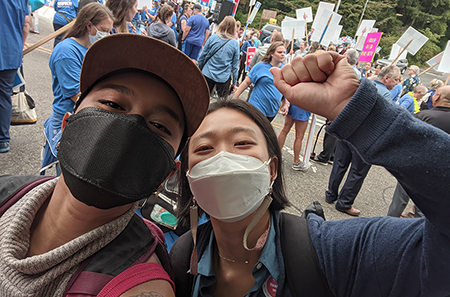
“I discovered what it is I wanted to do,” Sun says of the internship. “I am currently pursuing a master’s in social work to better my activism and learn how I can best give back to MPOP and other community organizations.”
UW senior Erika Olmos has similarly committed to her internship organization, LELO, which focuses on empowering low-income workers of color, recent immigrants, and women workers. After interning with LELO in 2022 and again in 2023, Olmos was recently hired by the organization to lead a new two-year food equity program, with support from a City of Seattle grant.
Olmos’s motivation for pursuing the labor internship was personal. “I come from a family of farmworkers who experienced mistreatment and worked to get unionized in the early 2000s,” Olmos says. “Being a voice to my family and community is rewarding.”
Another intern, Tala Pesigan (BS, Political Science, 2022), chose to work with SEIU Healthcare 1199 NW, one of Washington state’s largest healthcare unions. As part of the union’s Racial Justice team, focusing on the intersection of racial justice and workers’ rights, Pesigan attended committee meetings, delegate trainings, proposal votes, and bargaining sessions, and met members and leaders from various hospitals and clinics. After witnessing their dedication to improving workers’ rights, she became a union organizer with SEIU 1199 NW upon graduating from the UW.
“SEIU 1199 NW is determined to become an anti-racist organization and challenge the racist behaviors and structures in the organization, workplace, and beyond,” Pesigan says. “I was both excited and curious to see how I could continue the work with our members and our racial justice initiatives.”
Creating a Community of Interns
Sun, Olmos, and Pesigan each had different internship roles and opportunities, but they all shared their experiences at weekly meetings with other BAM interns. The weekly meetings are an important part of the BAM internship, encouraging interns to learn from each other and build community. Soohyung Hur, a UW doctoral student in geography, has served as the BAM meeting facilitator for the past two years — though students take the lead in shaping each meeting’s agenda.
“The students are all different people working with different organizations connected to the broader labor movement,” says Hur. “We hope the weekly meetings are places where they can reflect on their organization and how it fits into the movement, as well as think about various issues through the lens of labor.”
Guest speakers have included union organizers and academics with labor studies expertise. Toward the end of the quarter, the interns plan a culminating group project. This year’s cohort created an exhibit, “Contemporary Labor Organizing in Washington State,” that was on display at Odegaard Undergraduate Library through mid-May. The exhibit can still be viewed online.
Olmos’s contribution to the exhibit was a display about the unionization efforts of workers at Ostrom Mushrooms, recently renamed Greenwood Mushrooms Sunnyside. Given her family’s history as farmworkers, the project — like the internship — struck a chord.
“I was able to show my work to my parents recently and that was a meaningful moment,” Olmos says. “I hope that having it on display, along with my peers’ work, brings more awareness to labor issues.”
Learn more about the BAM Labor Internship.
To support the BAM internship and other programs of the Bridges Center, contribute to the Bridges Center Community Outreach and Events Fund.
More Stories
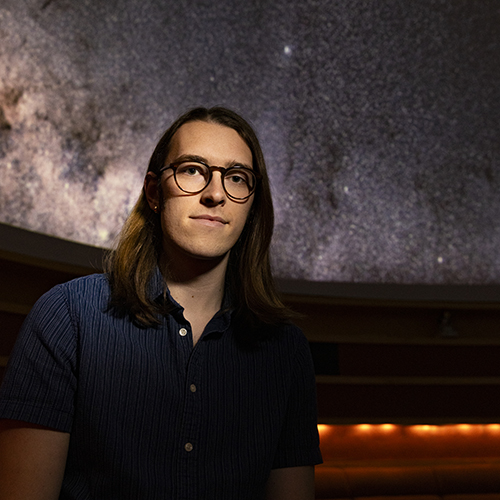
Tracking Comets, and Other Celestial Adventures
Using a powerful research telescope, astronomy and physics major Max Frissell identified a never-before-seen active comet. Now he’s hooked.
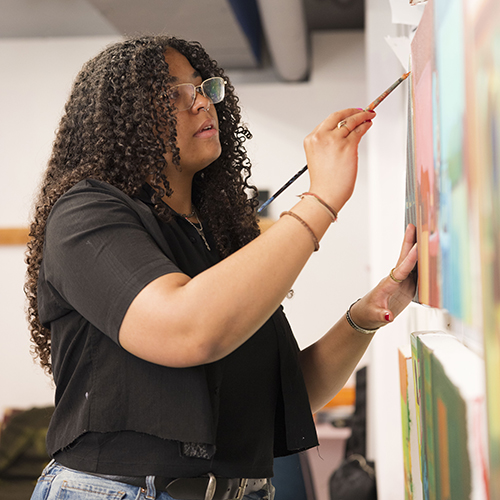
Making Art, Making Connections
While at the UW, artist Kyra Wolfenbarger was a researcher, museum intern, and arts writer. What shaped her most were the people she met along the way.
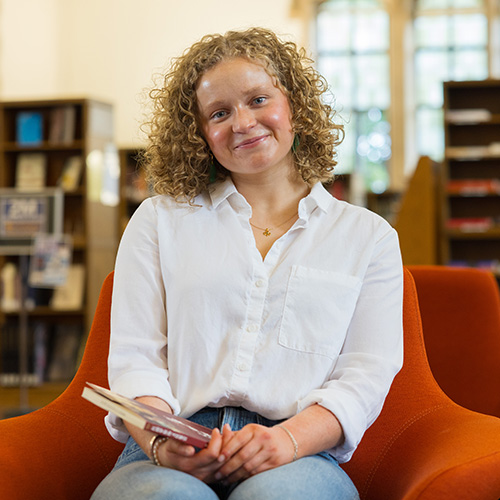
Exploring the World — and Global Careers
Study abroad in Vietnam and Madrid. An internship with the State Department. International studies major Grace Kelly explored the world as a UW student.
